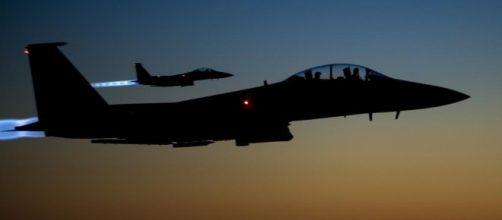As humankind starts to spread out across the solar system, mining the moon and asteroids and building settlements on Mars, future space colonists are going to need law and order to survive. They are going to need, in effect, a real-life version of Star Fleet. Space.com suggests that The United States Air Force may fulfill the role as the solar system’s policeman. The matter came up at the recent 33rd National Space Symposium in Colorado Springs, Colorado.
Some kind of military force would have to secure strategic points in space such as cis-lunar fuel depots, ice deposits on the moon, and eventually the Mars colony that people like Elon Musk are envisioning.
Terrorists, local criminals, and other state actors would pose a threat to space-based infrastructure, especially in the event of an Earth-side conflict. Perhaps it is time for a new service branch, a United States Space Force as if were.
The idea is not new. Of course, in science fiction such as “Star Trek” or the more recent “The Expanse,” a space born military more resembles the Navy than the Air Force, with a Marine Corps to do the ground fighting. But unlike the Navy, the Air Force seems to be thinking ahead. Many uncrewed space assets, such as navigational satellites, as under the control of the Air Force Space Command. The defense of these assets, in particular against satellite killer weapons being developed by China and Russia, is a matter of increasing concern among military circles.
Greater economic activity in space is just going to increase the number of targets that an enemy will have to take out in the event of an Armed Conflict.
What sort of weapons systems will need to be developed to secure the high frontier of space against a potential enemy? If things start blowing up in Earth orbit, the resulting debris will constitute a catastrophic threat to navigation that needs to be addressed. Part of space defense needs to be the development, at long last, of an efficient cleanup strategy of space debris.
What sort of defenses should be deployed on the surface of worlds such as the moon and Mars? Should they be enough to deny access to these places to an enemy or just as a deterrence?
What sort of “ground forces” should be developed? A constabulary? A Marine Corps? A little of both? Equipping and training for combat in low or no atmosphere environments with varying gravity, extremes of heat and cold, and radiation would be a formidable challenge, to say the least.
When people move out into space, armed conflict is inevitable to follow. How such will be managed is a question that needs asking and answering now.

